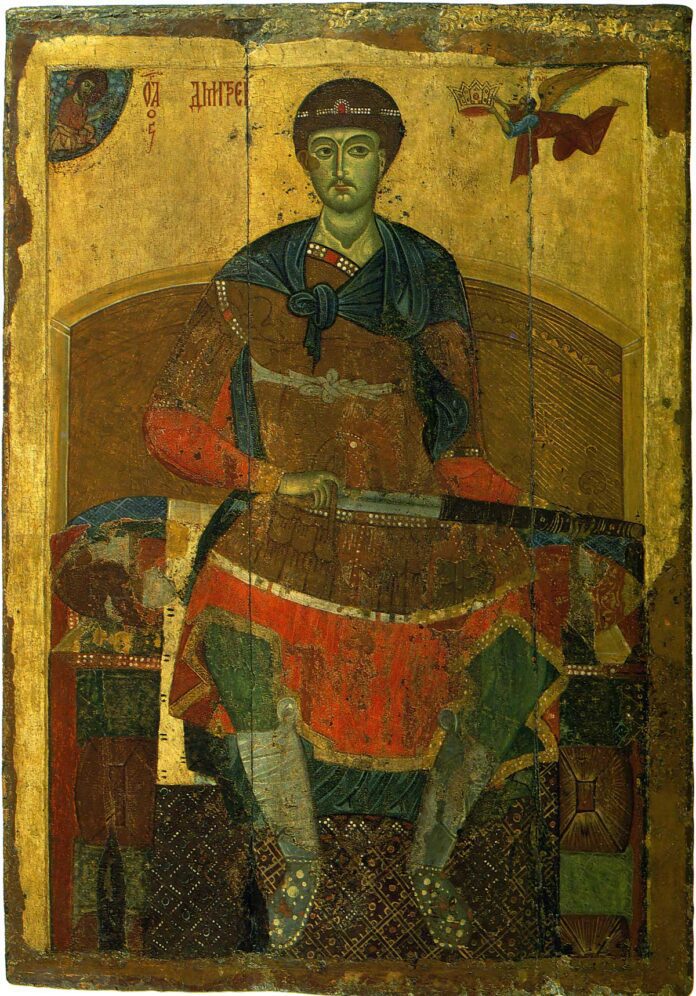Deacon and military martyr in Sirmium in the fourth century, Demetrius of Dalmatia embodies Christian courage in the face of Diocletian's persecution. Considered the second greatest military martyr of the East after Saint George, he is venerated under the title of "megalomartyr" in the Byzantine tradition. His testimony of faith, enriched by the popular piety that transformed him into a legendary figure, remains a model of fidelity to the point of supreme sacrifice. His memory invites us today to hold firm to our convictions in the face of worldly pressures.
Demetrius was serving as a deacon in the city of Sirmium, in Roman Dalmatia, when Emperor Diocletian unleashed the most violent persecution of Christians. This soldier turned minister of the Church refused to renounce his faith. His martyrdom in the fourth century marked Eastern consciences for more than a thousand years. Today, his example reminds us that spiritual fidelity sometimes requires braving ambient hostility, even at the cost of losing everything.

Biography: A Deacon Facing the Empire
Demetrius was probably born in the first half of the fourth century in Sirmium, the capital of Lower Pannonia. This strategic city, located in present-day Serbia, was a major administrative and military center of the Roman Empire. Historical sources attest that he exercised the diaconal ministry within the local Christian community.
In 303, Emperor Diocletian launched the "Great Persecution," the last and most ferocious attempt to destroy Christianity in the Empire. Imperial edicts ordered the destruction of churches, the confiscation of sacred books, the arrest of clerics, and the obligation for all citizens to sacrifice to the Roman gods. Sirmium, a garrison city, rigorously enforced these measures.
Demetrius continued his ministry clandestinely, strengthening persecuted Christians, distributing the Eucharist to prisoners, and organizing secret assemblies. His position as a deacon made him particularly visible and vulnerable. The authorities kept him under surveillance, seeking a pretext to arrest him.
The historical context reveals the brutality of this period. Between 303 and 311, thousands of Christians perished throughout the Empire. Sirmium was among the most active execution sites. Martyrologies mention several of Demetrius's companions executed in the same city.
His arrest probably took place around 304 or 305. Brought before the tribunal, he was ordered to sacrifice to the gods. Demetrius categorically refused. The judges offered him clemency if he publicly denied Christ. He maintained his confession of faith. The sentence fell: beheading as a rebel against imperial authority.
The Acts of the Martyrs, although late, preserve the memory of his courage in the face of torture. Demetrius walks towards execution praying aloud. His body lies in a Christian tomb near Sirmium. In the fifth century, a basilica was built on this site, which became a center of pilgrimage.
The subsequent confusion with Demetrius of Thessalonica complicates the story. Some Western dioceses, such as Gap in France, even claim a Demetrius as their first bishop, testifying to the prestige of this name in Christianity. The Roman Martyrology of April 9 soberly mentions: "At Sirmium in Pannonia, Saint Demetrius, martyr," establishing the minimal historical fact.
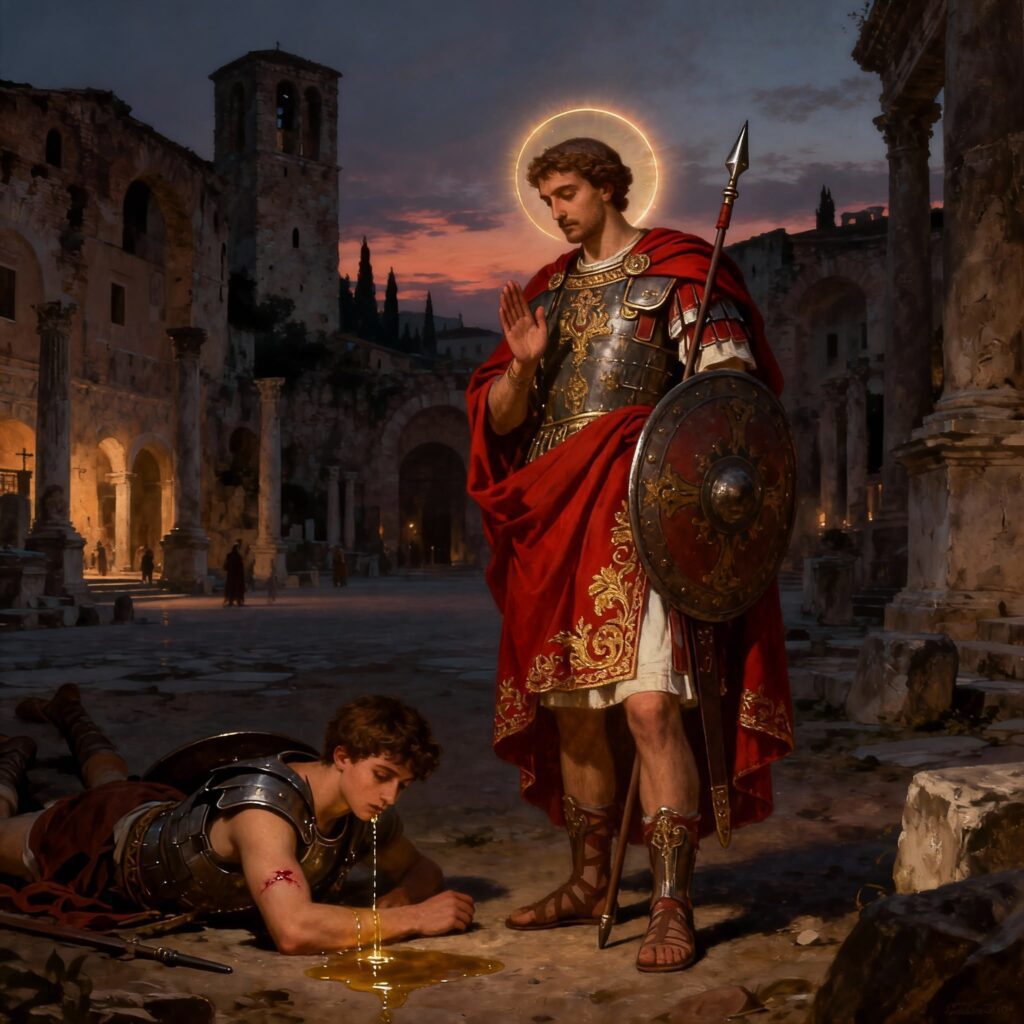
Legend of the deacon to the warrior proconsul
Byzantine hagiography gradually transformed the deacon of Sirmium into an epic figure. Popular piety was not content with the sober martyrdom of a minister of the Church: it shaped a grandiose legend around Demetrius of Thessalonica, amalgamated with the Dalmatian saint.
In this expanded version, Demetrius becomes proconsul of Greece and Macedonia, a noble Christian officer who publicly proclaims his faith. The emperor, angered by his proselytism, denounces him as a "troublemaker" and orders his arrest. He is imprisoned and then sentenced to fight in the arena against Lyaios, a gladiator reputed to be invincible due to his Herculean strength.
The dramatic tale continues: a young Christian named Nestor, frail and courageous, enters the arena alongside Demetrius. With a miraculous gesture, the adolescent defeats the giant with a single blow. The emperor, present at the games and dismayed by this humiliation, orders the immediate execution of the two Christians. They die together, victorious martyrs.
Legend adds a spectacular posthumous miracle: from Demetrius's body gushed forth a fragrant oil with healing properties, the "myron of Saint Demetrius." This miraculous oil flowed for centuries from his tomb in Thessalonica, attracting crowds of pilgrims. The sick anointed themselves with this substance, and soldiers took it away as divine protection.
This hagiographic amplification fulfills a profound symbolic function. Demetrius embodies the spiritual warrior who fights the forces of evil, the Christian David slaying the pagan Goliath. Saint Gregory Palamas, a fourteenth-century Byzantine theologian, comments: "The fangs of the wolves into whose midst Christ sent his disciple Demetrius, by their bites, opened springs in his body from which great joy flows to Christ's flock." The image transforms the violence of martyrdom into a source of grace.
Byzantine iconography consistently depicts Demetrius in horseman's armor, lance in hand, trampling the dragon or the persecutor. This warrior imagery particularly appealed to Christian soldiers and Slavic peoples, who adopted his cult en masse. Thessalonica became his principal sanctuary, and his name "Dimitri" spread throughout the Christian East.
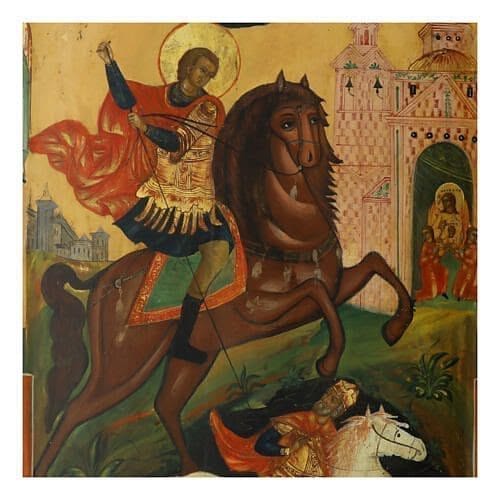
Standing firm in the storm
Demetrius teaches the virtue of constancy, that inner strength that refuses to compromise with injustice. In the face of social, political, or economic pressures that push us to betray our values, his example calls us to stand firm. Fidelity does not consist in imposing our faith on others, but in never denying it ourselves.
The Gospel resonates with his testimony: "He who endures to the end will be saved" (Matthew 24:13). Demetrius embodies this perseverance in the face of tribulation. His diaconal vocation placed him at the service of the poor and the persecuted, a ministry he maintained even in mortal danger.
His courage challenges us today: what compromises do we accept to avoid exclusion or ridicule? What loyalty do we show when our convictions cost us socially? Demetrius did not seek martyrdom, but he refused to lie. This integrity, symbolized by the miraculous oil gushing from his body, becomes a source of life for the entire community.
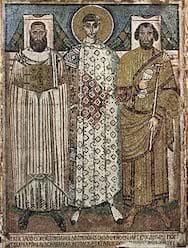
Prayer
Lord Jesus, you strengthened your servant Demetrius in the face of threat and death.
Grant us the grace to stand firm in our faith when the world pressures us to abandon our convictions.
Give us the courage of the witness who prefers to lose his tranquility rather than his truth.
Saint Demetrius, you who served the persecuted even at the risk of your life, intercede for us who seek the strength to remain faithful.
Obtain for us constancy in the small daily trials, so that our fidelity may grow and prepare us for greater challenges.
May our life become, like yours, a source of grace and encouragement for our brothers and sisters.
Amen.
To Live
- Identify a deep-seated belief that you have recently weakened through conformity, and take a concrete action today that clearly reaffirms it.
- Actively support someone you know who is being persecuted or ridiculed for their Christian or ethical values
- Spend fifteen minutes meditating on Matthew 10:16-22 on witnessing in hostile environments, noting a personal application
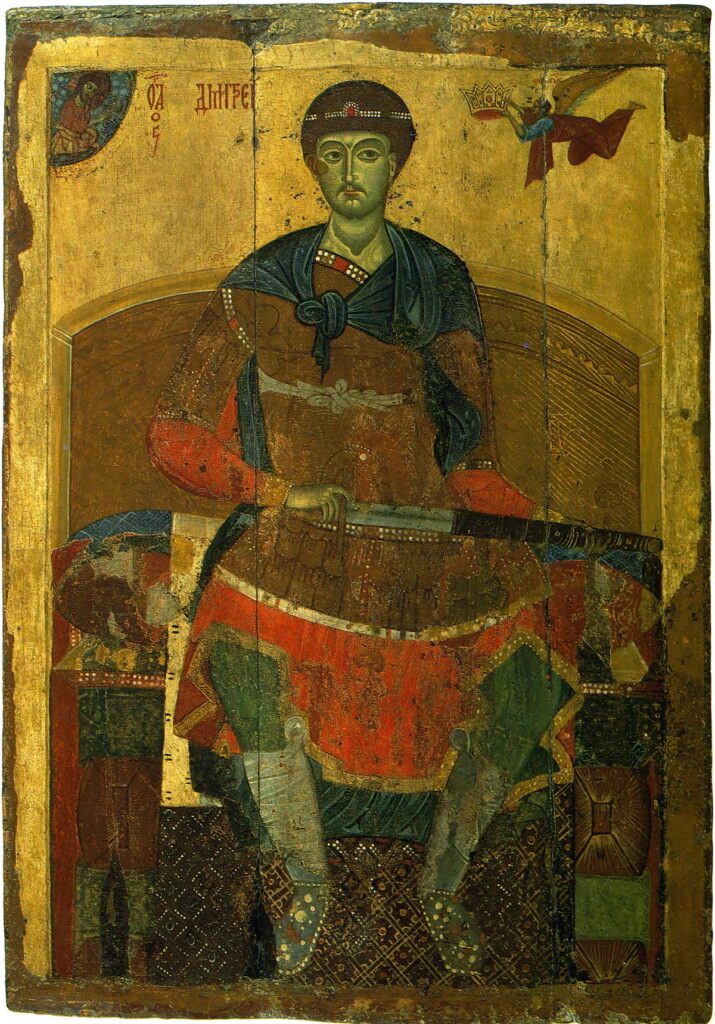
Locations: from Sirmium to Thessaloniki
The site of Sirmium, near present-day Sremska Mitrovica in Serbia, preserves archaeological remains from the Roman period. No basilica survives there today, but excavations reveal the importance of this city, where many martyrs perished under Diocletian.
Thessaloniki is home to the Major Basilica dedicated to Saint Demetrius, rebuilt after the fire of 1917. This early Christian church, founded in the fifth century, became the largest pilgrimage site in the Balkans. The saint's relics, disputed between Constantinople and Thessaloniki, rest beneath the altar in a silver shrine. Seventh-century Byzantine mosaics depict the saint in military garb.
The feast of Saint Demetrius, celebrated on October 26 in the Byzantine calendar, traditionally marks the end of the agricultural season in Greece. Slavic Orthodox communities, particularly in Russia, Bulgaria, and Serbia, honor the saint extensively. The name Demetrius remains one of the most popular in these cultures.
In the West, the diocese of Gap and Embrun in France maintains a local tradition making Demetrius its first bishop, a historical confusion which nevertheless reveals the universal influence of this martyr.
Liturgy
Readings and psalm: Wisdom 3:1-9 on the glorious fate of the persecuted righteous; Psalm 116 “Precious in the sight of the Lord is the death of his saints”; Matthew 10:28-33 on witnessing before men
Song and hymn: The Byzantine troparion of St. Demetrius celebrates "the megalomartyr who teaches the world piety"; the traditional hymn "Faithful Witness" is appropriate to honor this guardian of the faith until death.

